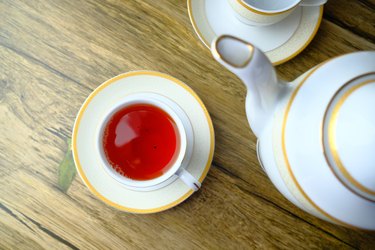
You come across a green box of Biguerlai Tea that claims to be slimming and detoxifying, and naturally your interest is piqued — what's the catch? Does Biguerlai Tea, a brand name for senna tea, have side effects?
As an international brand, Biguerlai Tea can be difficult to research or even buy in the United States, though people can order it through Lazada , an Asian sales site that carries several products under the Biguerlai brand, as well as on Amazon and eBay. The Biguerlai company does not have a website of its own.
Video of the Day
Video of the Day
Read more: 5 Steps to Brewing Your Healthiest Cup of Tea
What Is in Biguerlai Tea?
The label on Biguerlai tea lists its primary ingredient as senna, which the U.S. National Library of Medicine explains is an herb commonly used as an over-the-counter laxative. Chemicals found in senna called sennosides irritate and stimulate the lining of the bowel, making them effective for relieving constipation; however, there is not enough evidence to determine senna's effectiveness for weight loss, the purpose for which Biguerlai Tea advertises itself.
Weight loss, however, is one of the unhealthy side effects of long-term senna use mentioned by the National Institutes of Health (NIH). Other side effects are diarrhea and cramps. This may be because senna acts as a stimulant laxative, as it is classified by Harvard Health Publishing, and could be good for people whose bowel movements are slow.
In the United States, senna is commonly found in such products as Ex-Lax, Fletcher's Castoria and Senokot. According to the NIH, you should take only 15 to 30 milligrams of sennosides twice a day, and you shouldn't take sennosides for longer than one week.
Another adverse side effect, as noted by a review published in April 2018 in the Journal of Pediatric Surgery, relates to children who are not toilet trained and who may be exposed to senna-induced stool for prolonged periods of time (for example, after a nighttime accident). These children may experience blisters from the exposure. As long as diapers are changed frequently, however, senna should be safe for use in children.
Read more: 6 Teas to Stock Up On and Their Health Benefits
Senna Tea Side Effects
Drinking Biguerlai Tea might be considered harmless, but senna has potential side effects just like any other herbal supplement. Although the NIH notes that senna is well tolerated by most people, large doses of it for long periods can be harmful.
Because of its laxative effect, short-term side effects could be as simple as abdominal cramps and electrolyte imbalance. Mayo Clinic indicates that it could also cause black or tarry stools, blood in the stools, nausea, vomiting and stomach pain.
The bigger concern is long-term use of senna tea and the side effects that result after three to five months. It's at this point you could harm your liver. However, this harm could reverse itself as soon as you stop taking senna, according to the NIH.
Another unfortunate senna tea side effect might be dependence. As Harvard Health Publishing points out, people who take stimulant laxatives too often can come to depend on them for bowel movements.
Healthier Options Than Laxatives
If you're looking to improve your health by keeping your digestion moving and your system clean, your healthier and safer option is to opt for regular intake of fiber instead of Biguerlai Tea.
As the Cleveland Clinic explains, fiber will help regulate your bowel movements by drawing water into the colon and promoting regularity. This can improve your intestinal health by speeding up the process of food moving through your intestinal tract and preventing harmful substances from building up.
Fiber is also great for weight control because it keeps you fuller for longer periods of time, and it's great for lowering your cholesterol by sweeping fatty bile out of your body. It's important to keep in mind, as noted by a March 2015 article in Nutrition Today, that fiber from whole foods is more beneficial than fiber supplements.
The other great aspect of fiber is that it is usually found in foods that are also rich in vitamins, minerals and antioxidants. Be careful, however, about adding too much fiber to your diet at once, as this can cause bloating. You also need to consume plenty of water (remember your eight glasses a day) for the fiber to absorb to prevent constipation.
- U.S. National Library of Medicine: “Senna”
- National Institutes of Health: “Senna”
- Mayo Clinic: “Oral Route”
- Harvard Health Publishing: “Don’t Bomb the Bowel With Laxatives”
- Cleveland Clinic: “Improving Your Health With Fiber”
- Nutrition Today: “Evidence-Based Approach to Fiber Supplements and Clinically Meaningful Health Benefits, Part 2”
- Journal of Pediatric Surgery: “Are Senna Based Laxatives Safe When Used as Long-Term Treatment for Constipation in Children?”